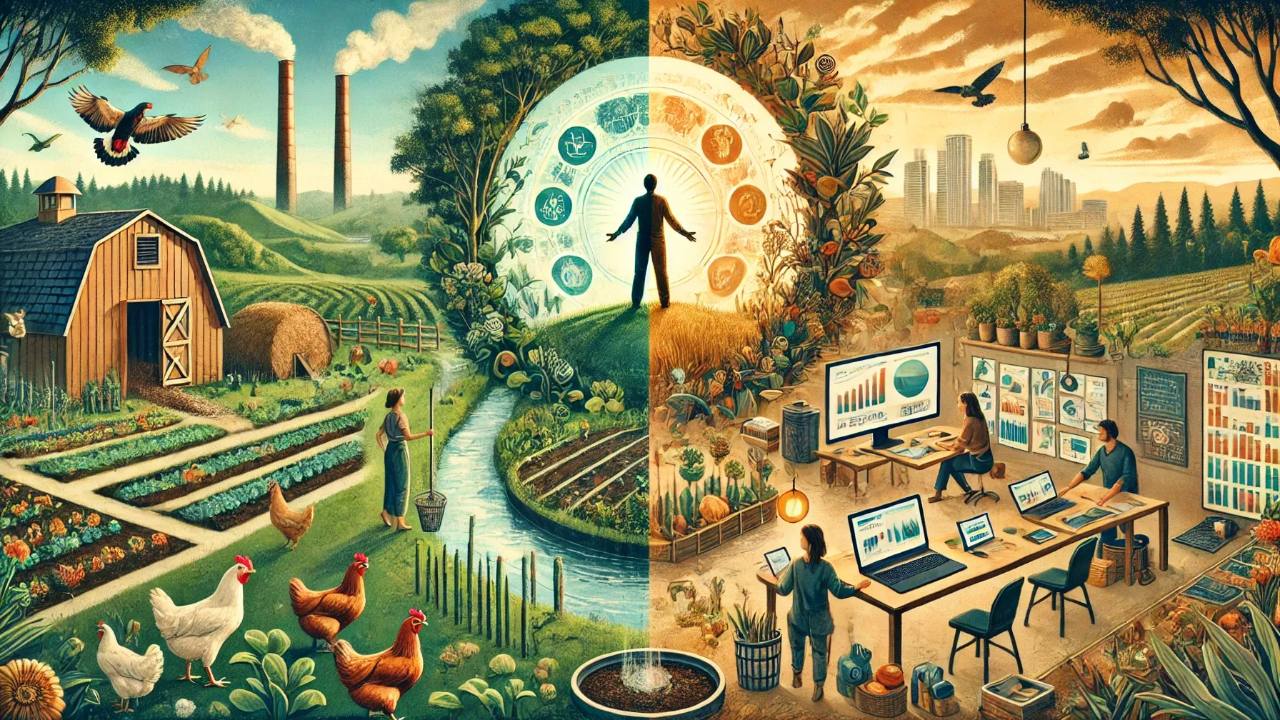Biohacking Won't Work Until You Understand This
Introduction:
As someone who has spent years immersed in permaculture and building ecological communities, my perspective on biohacking might seem unusual. But here’s what I’ve come to understand: the ecological crisis we face isn’t simply an environmental issue. It’s a psychological and spiritual crisis, an outward manifestation of our own inner discord.
In many ways, we’re at a tipping point where the health of our planet and our personal well-being are deeply interconnected. The disconnection we feel within ourselves—our fractured belief systems, our sense of separation from nature—is echoed in the environmental breakdown around us.
That’s why biohacking, and more importantly, belief-shifting, matters to me. Fixing our planet starts with fixing ourselves. Positive habits, the kind that biohacking promotes, only take root when they’re grounded in empowering belief systems. And that’s what I want to share with you here—a way to shift your beliefs so you can build the habits that will transform not only your life but also, in some small way, the world around you.
|
The Science of Biohacking: Why Techniques Aren’t Enough
Let’s start with the basics. Biohacking is the science of optimizing your body and mind through intentional practices. From meditation and specific diets to sleep optimization and cold exposure, biohacking offers tools that can lead to better mental clarity, higher energy levels, and a sense of peace.
And there’s no denying that biohacking works. Science backs it, and many people report life-changing results. But there’s a crucial piece missing in most discussions about biohacking: the role of belief systems.
Because even with the perfect set of habits, without an empowering belief system, biohacking will always feel like an uphill battle. The habits may start strong, but they rarely last because they’re not grounded in a belief that truly drives transformation.
The Invisible Barrier: Disempowering Beliefs
Here’s a truth that most people know intuitively—better habits lead to a better life. So, why do so many struggle to maintain those habits? Why do we start strong, only to fall back into old patterns?
The answer lies in our belief systems. These are the stories we tell ourselves about who we are, what we deserve, and what’s possible. And, unfortunately, many of us carry beliefs that are anything but empowering. Take, for instance, the common story that "humans are inherently harmful to the planet and should minimize their impact." It’s a narrative rooted in caution, maybe even guilt, and while it may be well-intentioned, it’s not particularly inspiring. When you believe this story, it’s easy to fall into patterns of avoidance or self-doubt rather than enthusiastic action.
Now, imagine if that belief shifted to something different, something expansive. What if, instead of seeing yourself as a burden to nature, you saw yourself as an essential part of it? What if you believed that your desires and dreams are part of a divine plan?
This isn’t about proving one story over another. It’s about choosing the story that drives the best, most inspiring action.
Choosing Empowering Beliefs: Rewriting Your Story
Let’s go deeper into what an empowering belief system might look like. Instead of “Humans are a threat to the environment,” imagine if your core belief was this: “Humans are a vital part of nature, and our desires are part of a divine plan.”
Think about how this belief would change the way you approach biohacking. Instead of adopting new habits out of a sense of guilt or “fixing” yourself, you’d adopt them out of a sense of purpose. You’d believe that your deepest desires—your goals, your ambitions, your dreams—aren’t just random; they’re part of something much bigger.
This belief isn’t just empowering; it’s transformative. When you truly believe that your heart’s deepest desires are part of a divine plan, pursuing those desires becomes a mission. Biohacking and habit formation stop being struggles and start being natural outcomes. They become the tools you use to fulfill your purpose, not tasks to check off a list.
Reformatting Your Story: How to Shift Your Beliefs for Lasting Change
Changing your belief system isn’t about waking up one day with a new worldview. It’s a process, and it starts with awareness. Here’s how you can begin:
-
Identify the Current Story
Start by becoming aware of the stories you currently believe about yourself and humanity. Write them down. Which ones feel limiting? Which ones feel like they’re based on fear or avoidance? -
Ask Yourself, 'Is This Story Empowering?'
Once you identify a belief, ask if it helps you take positive action. For example, does seeing yourself as harmful to the planet inspire you? Or does it make you hesitant and unsure? Choosing beliefs that inspire action is essential. -
Rewrite the Story
Take those limiting beliefs and rewrite them into stories that empower you. For instance, change “I need to minimize my impact” to “I’m here to fulfill a mission, one that aligns with nature.” Beliefs that honor your unique potential and purpose are far more likely to support lasting change. -
Live Out the New Story
Transformation happens when you start living in alignment with your new beliefs. As you practice biohacking techniques—meditation, nutrition, exercise—do so with a mindset that you’re honoring a sacred mission. You’re not just improving yourself; you’re preparing yourself to make an impact.
Conclusion: Rewriting Beliefs, Reclaiming Your Potential
Biohacking can transform your life, but only if you pair it with beliefs that allow you to flourish. Without an empowering belief system, even the best habits can feel like chores. With the right beliefs, however, biohacking becomes second nature—a means to fulfill the mission you’re here to pursue.
So ask yourself: Are your current beliefs helping you become the person you want to be? Are they empowering you to pursue your deepest desires with enthusiasm?
Rewrite your story, embrace your purpose, and let biohacking become the natural expression of a life aligned with your highest potential.




